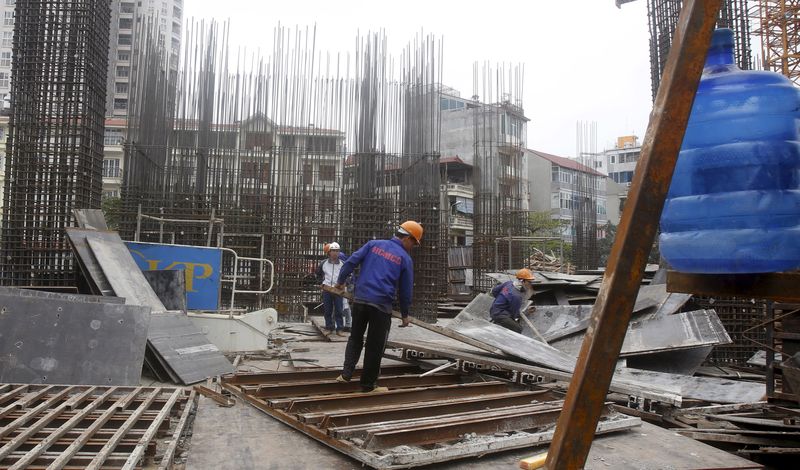HANOI (Reuters) -A rough year for Vietnam's real estate sector has seen developers miss interest payments on debt, amid a credit crunch spurred by ill-timed government measures, although spillover risk has been limited.
The sector was the worst performer last month on the falling Ho Chi Minh City stock exchange, with a drop of nearly 16% on the month, says key Vietnam investor Dragon Capital.
That capped two years of turmoil in developers' shares that spread last year to corporate bonds, hitting project development and leaving ghost blocks of high-end property.
WHICH DEVELOPERS ARE IN TROUBLE?
No Va Land is the largest listed developer to face problems, with its shares down more than 80% in a year, after missing interest payment deadlines on domestic and foreign bonds that triggered a standoff with some international creditors.
Shares of the largest listed developer, Vinhomes, part of the country's biggest conglomerate, Vingroup, fell 6.2% on Friday to their lowest since March, following an issue of new convertible bonds to refinance obligations.
Other non-listed companies who defaulted recently include Hung Thinh Corp, a major developer in southern Vietnam, and Van Thinh Phat, whose chairwoman was arrested in a graft crackdown last year, according to VISRating, which is partly owned by Moody's (NYSE:MCO).
Buildings stand empty with interiors unfinished in developer Sun Group's "Mediterranean town" on the southern island of Phu Quoc, while the skeletons of incomplete high-rises flank shiny towers in Hanoi built by another developer, Sunshine.
And the pressure is mounting, with real-estate bonds of about $6 billion set to mature each this year and the next, nearly three times more than in 2022.
HOW LIKELY ARE SPILLOVER RISKS?
In September, the Asian Development Bank warned of potential spillover into banking from irregularities in corporate bonds and real estate markets, although troubled bonds made up just a small portion of total bank credit.
Jean Xavier of S&P Global said there was "no risk of massive contagion", but warned about a slowdown in key consumer sectors and the negative impact on areas closely linked to real estate, such as construction and building products.
WHICH BANKS ARE MOST EXPOSED?
The banking system's exposure to the property sector amounts to about 25% of total loans, says S&P Global, mostly through mortgages, which are not viewed as risky, however, thanks to robust employment.
Corporate bond holdings are about 3% of banks' total loans, said S&P Global, which estimated between a third and a half were related to property.
The banks most exposed to the sector are Southeast Asia Bank, Maritime Bank, Asia Commercial Bank, Vietnam Prosperity Bank (VP Bank) and Sacombank, 2022 data cited by VISRating shows.
Of these, only VP Bank ranks among the biggest lenders.
HOW DID THE TURMOIL START?
Analysts blame the worst troubles on a long-running graft campaign that authorities stepped up at the end of last year.
They see the Oct. 2022 arrest over financial fraud of Truong My Lan, chairwoman of Van Thinh Phat Holdings Group, as a turning-point after which confidence dropped.
The arrest followed tougher rules on transparency and private placement of corporate bonds adopted that September, and coinciding with an economic slowdown, so that authorities were forced to suspend them a few months later, as the market froze.
Bond issuance drew to a halt and bank loans fell, spurring the government to repeatedly urge lenders to boost credit.
IS VIETNAM A NEW CHINA?
While ill-timed government measures, companies' high debt and oversupply are responsible for the sectors' woes in both countries, conditions are different in Vietnam.
Its long-term prospects are more positive, said S&P's Xavier Jean, as a younger population and an expanding middle-class are set to keep demand for property high.

Vietnam has a less acute situation of oversupply and speculation than China, he added, while real estate's contribution to its economy is also smaller.
($1=24,606 dong)